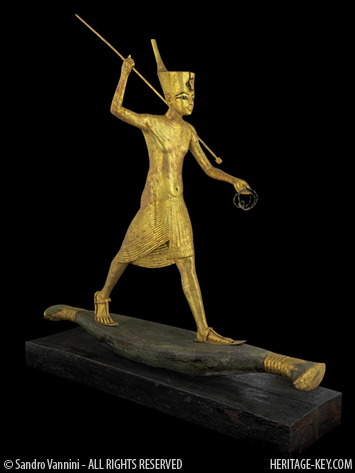 A researcher has uncovered evidence of a widespread scam in Israel that results in tourists buying recently looted artefacts without their knowledge. Buying antiquities in Israel is legal if they were found before 1978, the year a major antiquities law was passed. There are numerous dealers in Israel, who are required to register with the Israel Antiquities Authority and keep an inventory of the artefacts they have for sale. Dr. Morag Kersel, of Brown University in the United States, has been studying the illegal antiquities trade in Israel, Jordan and the Palestinian Territories.
A researcher has uncovered evidence of a widespread scam in Israel that results in tourists buying recently looted artefacts without their knowledge. Buying antiquities in Israel is legal if they were found before 1978, the year a major antiquities law was passed. There are numerous dealers in Israel, who are required to register with the Israel Antiquities Authority and keep an inventory of the artefacts they have for sale. Dr. Morag Kersel, of Brown University in the United States, has been studying the illegal antiquities trade in Israel, Jordan and the Palestinian Territories.
Dr Kersel has been conducting interviews with anyone involved in antiquities who would agree to talk to her, including dealers, collectors, residents engaged in looting, government officials and archaeologists. These interviewees are guaranteed anonymity so that they can speak freely about the situation in the region. Dr. Kersel told me that she interviewed 36 antiquities dealers in Israel. Out of these dealers roughly half admitted to engaging in an elaborate scheme that allows recently looted artefacts to be sold to tourists.
Loophole in the Law
Heres how the scheme works. While dealers have to keep an inventory of everything they sell, those inventories are often kept vague. A listing that says that a dealer owns a pot dated to the Bronze Age doesnt mean very much, since many pots of that era will be in their shop.
A tourist who buys the artefact will get a certificate of authenticity but will often forget something important an export permit.
Lots of people who purchase artefacts dont know that theyre supposed to ask for an export permit the law doesnt require the sellers to offer you an export permit, said Dr. Kersel at a presentation at the University of Toronto in Canada.
Without the export permit the sale isnt officially registered and the dealer can take the registry number and use it on a new and often looted antiquity. Since the inventory descriptions are kept vague it isnt hard to find an artefact that looks similar to the one that was just sold.
Material that was looted as recently as last week was illegally entering the legal market through an exchange of registry numbers, said Dr. Kersel.
The tourist could, of course, be caught trying to take the antiquity out of the country without a permit. But even if they are, it’s hard to fault the dealer. After all they are under no obligation to let tourists know that they need an export permit.
Why Did the Dealers Confess?
Perhaps the most striking thing about this research is how many dealers admitted to it more than a dozen of them. Dr. Kersel told me that the reason they admitted to this is that they are fed up with the practice and the system that makes it easy to carry it out.
Many of them told me they probably wouldnt do it if the guy next door wasnt doing it, she said. As far as they’re concerned the system as it currently stands doesnt really work.
Kersel said that the Israel Antiquities Authority is aware that this scam is taking place but lacks the resources to clamp down on it. She pointed out that therewere 65 registered dealers in Israel while she was in the country andonly 2.5 officers dedicated to enforcing Israels antiquity laws. There simply are not enough people to go around.
The Looters
 Dr. Kersel also talked to people engaged in looting andlearned a bit about what theirmotives are. Not surprising is the fact that many of them do it for money.
Dr. Kersel also talked to people engaged in looting andlearned a bit about what theirmotives are. Not surprising is the fact that many of them do it for money.
Poverty is certainly not a stranger in the Middle East. Just recently the Jerusalem Post reported that nearly one in three children in Israel lives below the poverty line. As of 2002 the general poverty rate in Jordan was reported at 14.2%. The West Bank economy has been hit hard by political conflict and poverty is rampant there.
However, there are some other motives for looting that you may not have guessed. One of them is believe it or not recreational.
People are very interested in getting out on the weekend in the land and its just something that they do, Dr. Kersel said in an interview. They take their families out, have a picnic and dig around on their Tell.
A Tell is a man-made hill that many modern day communities, in the Middle East, are situated on. If people have been living in the same place for thousands of years, the debris from that time will pile up, forming this hill.
Kersels research also revealed the presence of something more insidious a practice termed ‘resistance looting’. That is people looting to try and remove evidence of foreign occupation. So far she has found evidence for this in the West Bank, but not in Israel or Jordan.
People looted to find and destroy any evidence of occupation on their land, she said in at the Toronto lecture. Anything with a Jewish motif or anything with a Christian motif… it just so happens that those things are (worth hundreds) of dollars on the market.
She said that she hasnt found evidence that ‘resistance looting’ is being carried out in an organized way in the West Bank. It seems to be more ad-hoc and not so organized.
I also asked her whether there is any evidence of terrorist groups being involved in the trade in Israel/Jordan/Palestine. She said that that she has found no evidence of that so far.
Telling the Truth
The most obvious question this research begs is: how do we know people are telling the truth?
Its something I grappled with, said Dr. Kersel. The anonymous format of the study means that there is no way for other people, such as this reporter, to check with individual people. Even the transcripts cannot be publicly released and must be destroyed after a few years.
Dr. Kersel admits that she cannot be certain that every person told the truth, every time. But there are patterns more than a dozen antiquities dealers in Israel admitted to taking part in this scam, making that find almost impossible to dismiss. Several people said that resistance to occupation played a role in their decision to loot, making this motive difficult toignore as well.
Why Looting Matters
Another question that may be asked is: why does this matter? If people, especially impoverished individuals, choose to loot for money then why should they be stopped?
In short the looting of sites means that archaeologists lose valuable information needed to reconstruct the past. Once an artefact has been removed from context, without proper note-taking, then archaeologists cannot say where it came from and what material it isassociated with. This note-taking is very important and archaeology students have it drummed in their heads to record every relevant detail.
Museums are full of artefacts that were taken without excavation. The Royal Ontario Museum in Toronto Canada has a sculpture which they believe to be of Cleopatra VII – the last ruler of Egypt. They acquired it in the early 20th century but, because they don’t know what site it’s from, didn’t make the identification until just after the year 2000.





